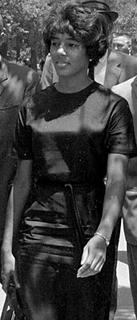 Tonight's entry is a brief one, honoring the courage of Vivian Malone Jones, who passed away today at the age of 63. In 1963, she and James Hood attempted to enroll in the University of Alabama, an act of bravery and resistance that sparked one of the most famous scenes in the long and brutal history of racism in this country; Alabama's then-governor, Democrat George Wallace, infamously stood in the doorway of Foster Auditorium, with state guard troops, to block the two black students' entry, fulfilling a campaign pledge to halt integration "at the schoolhouse door"; at his inauguration, he had proclaimed "Segregation now, segregation tomorrow, segregation forever." Since a federal judge had ordered that the students be allowed to enroll, Deputy Attorney General Nicholas Katzenbach, following a script that had been choreographed by his boss, Robert F. Kennedy, with Wallace, approached the governor and asked that the students be admitted, which Wallace publicly defied. Four hours later, National Guard troops who'd been federalized by President John F. Kennedy, Malone and Hood, with Katzenbach and other administation officials, were able to enter the building, go to their dormitories, and enroll.
Tonight's entry is a brief one, honoring the courage of Vivian Malone Jones, who passed away today at the age of 63. In 1963, she and James Hood attempted to enroll in the University of Alabama, an act of bravery and resistance that sparked one of the most famous scenes in the long and brutal history of racism in this country; Alabama's then-governor, Democrat George Wallace, infamously stood in the doorway of Foster Auditorium, with state guard troops, to block the two black students' entry, fulfilling a campaign pledge to halt integration "at the schoolhouse door"; at his inauguration, he had proclaimed "Segregation now, segregation tomorrow, segregation forever." Since a federal judge had ordered that the students be allowed to enroll, Deputy Attorney General Nicholas Katzenbach, following a script that had been choreographed by his boss, Robert F. Kennedy, with Wallace, approached the governor and asked that the students be admitted, which Wallace publicly defied. Four hours later, National Guard troops who'd been federalized by President John F. Kennedy, Malone and Hood, with Katzenbach and other administation officials, were able to enter the building, go to their dormitories, and enroll.The day after they'd enrolled, Mississippi civil rights leader Medgar Evers was murdered in his driveway by Byron de la Beckwith and others. Malone, vowing to show no fear, went to classes that day, and despite the extreme social isolation--White students would neither speak nor socialize with her--as well as the constant threat of violence, including bomb threats (three actually detonated not far from her dorm room at one point during her two years there), she completed the coursework for her degree in 1965, becoming the first Black graduate in the University of Alabama's 143-year history. (Hood dropped out after two months to preserve his sanity and didn't return to Alabama until more than 30 years later, to receive his doctorate in education.) Malone, who'd subsequently married the young student driver, Mack Jones, from nearby HBCU Stillman College that the university had contracted for her, returned in the 1990s to receive a masters in education from the university. For the rest of her life, she was active in civil rights organizations, including the NAACP, the SCLC, and the National Council of Negro Women. In 1996, when the Wallace Family Foundation awarded her the Lurleen Wallace Award for Courage, she met with George Wallace, and, according to the Washington Post, asked him directly about his actions some 33 years before:
"I asked him why did he do it," she said. "He said he did what he felt needed to be done at that point in time, but he would not do that today. At that point, we spoke -- I spoke -- of forgiveness."
On WBEZ yesterday, I heard Malone Jones, in an interview from a few years, say that she was conscious of making history, but what was more important to her was that her courage would make it possible for the generations of Blacks who would come after her. And it did. Black students are now enrolled at every one of Alabama's public institutions of higher education, and at public universities across the South, as well as private institutions that once admitted very few to none. A widow (her husband, Dr. Mack Jones, died in 2004), she leaves her two children, three grandchildren, a number of siblings and family members, and a tremendous legacy. Thank you, Vivian Malone Jones, and those of your generation whose courage and sacrifice made our own freedoms possible!









No comments:
Post a Comment